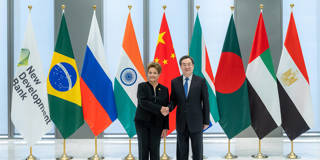Not only has the West failed to convince the rest of the world that it also has a stake in Ukraine’s defense, but this failure is emblematic of a broader shift. The sooner that the United States, Europe, and their allies recognize the limits of the post-1945 international institutions they established, the better off they will be.
BERLIN – When NATO leaders descend on Vilnius this month for the alliance’s annual summit, they will demonstrate that the organization, newly united behind support for Ukraine, is far from “brain dead,” as French President Emmanuel Macron infamously described it in 2019. But NATO’s new vitality belies a larger problem: the West’s failure to convince the rest of the world that it also has a stake in Ukraine’s defense is emblematic of a broader shift.

BERLIN – When NATO leaders descend on Vilnius this month for the alliance’s annual summit, they will demonstrate that the organization, newly united behind support for Ukraine, is far from “brain dead,” as French President Emmanuel Macron infamously described it in 2019. But NATO’s new vitality belies a larger problem: the West’s failure to convince the rest of the world that it also has a stake in Ukraine’s defense is emblematic of a broader shift.